 Vintage cars show kicks off in London
Vintage cars show kicks off in London
 Gorgeous scenery in NE China
Gorgeous scenery in NE China
 Picturesque Barkol grassland in Xinjiang
Picturesque Barkol grassland in Xinjiang
 Small Wild Goose Pagoda - A World Cultural Heritage Site along the Silk Road
Small Wild Goose Pagoda - A World Cultural Heritage Site along the Silk Road
 Maritime Silk Road Luxuries of the Han Dynasty
Maritime Silk Road Luxuries of the Han Dynasty
 Ciao! Chinese beauties!
Ciao! Chinese beauties!
 An eye feast: BFA freshmen registration
An eye feast: BFA freshmen registration
 Top 10 most lavish weddings
Top 10 most lavish weddings
 Most amazing chi-pao beauties
Most amazing chi-pao beauties
 Chinese lingerie brand arrives in Las Vegas
Chinese lingerie brand arrives in Las Vegas
XINING, Sept. 25 -- Ma Linsheng, a Muslim barber with over 30 years of practice, believes his job is critical to helping people follow the Islamic faith.
After all, the Holy Prophet Muhammad said the key to paradise is prayer, and the key to prayer is cleanliness.
The 50-year-old man is in charge of a small barbershop near the Dongguan Mosque, one of China's most renowned mosques, in Xining, the provincial capital of northwest China's Qinghai Province.
It is customary for Muslims to keep clean and tidy before entering a mosque. The barbershop is part of the cleansing service the Dongguan Mosque provides for pilgrims, especially those who travel a long way.
In business for over five decades, the shop has changed little since Ma's father handed it down to him 27 years ago, with mottled chairs, a burnt stove and rusty tank.
China is home to about 23 million Muslims. In Qinghai, they make up around one-fifth of the total population. The 900-year-old Dongguan Mosque is located in the east of Xining, where over 120,000 Muslims from the Hui and Salar ethnic minority groups reside.
The mosque enjoys a high reputation among Muslims in China. Around 200,000 Muslims flocked to it to celebrate the end of Ramadan in July.
"The transportation in the neighborhood was suspended and the streets were packed with pilgrims from home and abroad praying," recalled Ma.
The shop, which is located just a few steps away from a side door of the mosque, is never short of customers. The customers, many of whom are residents of the neighborhood, can go to the mosque right after getting a haircut, usually during noon before the Zuhr, the post-midday prayer.
The 20-square-meter shop manages to squeeze in five barber chairs, along with three barbers hired by Ma: 55-year-old Ma Lu, 49-year-old Ma Cai and 32-year-old Gao Qiao.
All four are Muslims who strictly adhere to their religious practices. They perform prayers five times daily in the mosque, or in the shop if work is too busy.
Blankets for prayer belonging to the barbers and their friends are piled behind the door. "Some of my friends live far from here, so they put their blankets in our shop," Ma said.
The barbershop faces a halal market, which serves Muslim food such as beef and yak yogurt, and neighbors often rest in the shop after strolling around. Ma is always hospitable and treats everyone who comes into his shop as a friend.
The shop receives around 40 customers every day, and more than 50 during festivals. Most of the customers are men, and they often ask to have their heads shaved and their beards trimmed short and neat.
"It takes me only eight minutes to shave a head and less than 30 minutes to finish a whole 'set' [of both beard and head]," Ma said with a proud smile.
Smoking and drinking alcohol are taboo in the shop.
"Doing a haircut for drunken people is like a slap in the face," said Ma, as alcohol is forbidden by Islam.
While some of Ma's principles are unshakable, some have changed with the times. Ten years ago, women were not allowed to get their hair cut in the shop because it was believed to be inappropriate.
Now, women may also have their hair cut at Ma's shop, though female customers are still rare.
"People are more open-minded now," said Ma.
"But most of the people who come to my shop are old men and kids brought by their parents, while young people prefer shops that can do fashionable hair styles," he said.
When young people do come, it is often to get their babies' hair cut when they turn 100 days old, which according to Chinese tradition will bring the infants a blessed and long life. The barbers at Ma's shop are known for their skill at working with infants.
"First we soften the baby's hair with a warm, wet towel. Then we lay a thin coating of soap suds over the baby's head. We need the parents' help to support the baby's head while shaving," said Gao Qiao, another barber.
"A baby's first haircut is very important to a family, as it's more or less a 'baptism' for the babies," said Gao.
During the noon rush hour, the barbers take turns having lunch, usually some fried potatoes with steamed buns brought by the imam from the mosque.
Around 3 p.m., when there are fewer customers, Ma Linsheng watches TV on his cell phone, which is how he found out about the recent terrorist attacks in neighboring Xinjiang Uygur Autonomous Region.
"Violence and terror attacks are not tolerated anywhere in the world.Peace is what all people want and what we pray for every day," he said.
The barbershop has kept Ma from travelling. Although he believes his service to customers is practice of his faith, he still longs to make a pilgrimage to Mecca.
"That's my dream and a duty as a Muslim," he said.
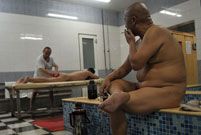 Century-old public bath closes door in Beijing
Century-old public bath closes door in Beijing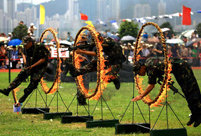 Military training in Hong Kong
Military training in Hong Kong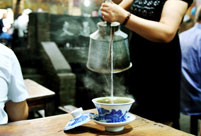 Teahouses in Chongqing: Worship to the leisure lifestyle
Teahouses in Chongqing: Worship to the leisure lifestyle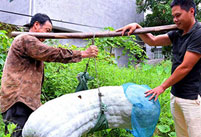 Giant white gourd weighing 87 kilograms appears in SE China
Giant white gourd weighing 87 kilograms appears in SE China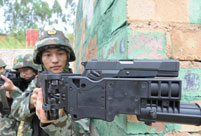 Advanced arms help to safeguard China-ASEAN Expo
Advanced arms help to safeguard China-ASEAN Expo Leading director Wang Quan'an detained for 'buying sex'
Leading director Wang Quan'an detained for 'buying sex' Heaven on earth: Dongjiang Lake in Hunan
Heaven on earth: Dongjiang Lake in Hunan Mixed reaction to smartphone sidewalk
Mixed reaction to smartphone sidewalk Amazing aerial photos of China's Xisha Islands
Amazing aerial photos of China's Xisha Islands Lingerie show at 2014 Miss China
Lingerie show at 2014 Miss China Songstress Li Xianglan dies at 94
Songstress Li Xianglan dies at 94 Police recruiting posters
Police recruiting posters Anshun Daxi- Living fossil of Chinese drama
Anshun Daxi- Living fossil of Chinese drama Urban farmers in China
Urban farmers in China 'Firepower-2014 Weibei'military exercise
'Firepower-2014 Weibei'military exerciseDay|Week|Month